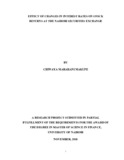| dc.description.abstract | The objective of the study was to determine how and the extent to which stock returns at the Nairobi Stock Exchange (NSE) are impacted by changes in interest rate. It also aimed at reviewing the increasing body of theoretical and empirical studies that have endeavored to examine the range of magnitude and effects of interest rates on the stock market returns at the NSE. The study employed a hybrid of descriptive and causal research design. The target population was all the listed sixty seven firms at the NSE, the sample was represented by the NSE 20 Share Index. Secondary sources of data were employed, and data was collected on; the average weighted lending rate, the inflation rates, the GDP, the exchange rates, and the NSE 20 Share Index. The unit period of analysis was quarterly, and data was collected for the period from January 2008 to December 2017. The period which comprised of 40 quarters. The study applied correlation analysis and multiple linear regression equation with the technique of estimation being Ordinary Least Squares (OLS) so as to establish the relationship of interest rates and stock market returns. The interest rates were adjusted off the effect of inflation to get real interest rates. The study found that a significant positive association exists between real interest rates and the stock market returns. A unit increase in the real interest lending rate would lead to a 0.646 increase in the stock market returns. However, when lagged effect of period t-1 of the predictor variable was introduced into the model, it did not exhibit any significant effect on the stock market returns. Thus, time lags do not significantly affect the response variable. When the control variables, GDP growth and change in the exchange rate, were introduced into the model, they also did not exhibit a significant effect on the stock market returns. Thus, the GDP growth and changes in the exchange rate do not significantly influence stock market returns. The study concluded that that real interest rates and stock market returns have a positive significant relationship. Thus, higher real interest rates lead to higher returns in the stock market. The study recommended that; the governments through its various arms can device methods of influencing and stimulating the stock market. Investment banks, stock brokerage firms, institutional investors, and individual investors, can try the strategy of investing in the stock market when they anticipate a rise in real interest rates because the returns are likely to increase during the period. | en_US |



